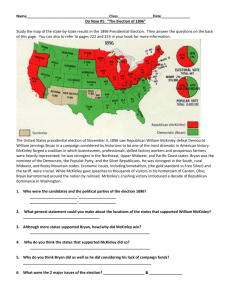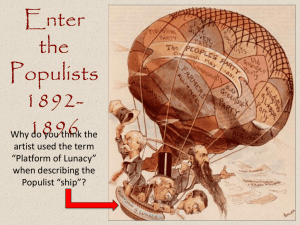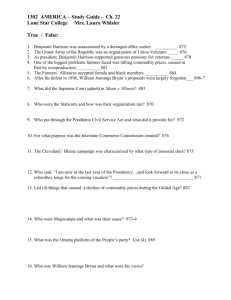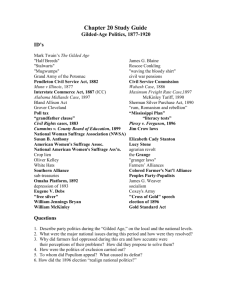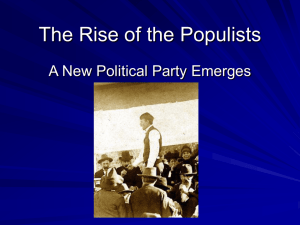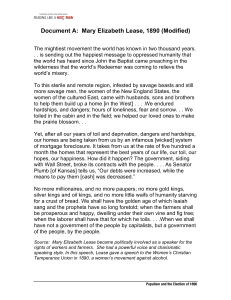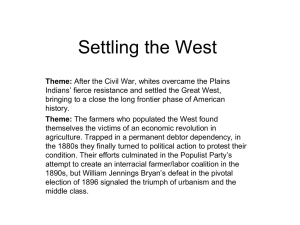history 211 storyboard template
advertisement
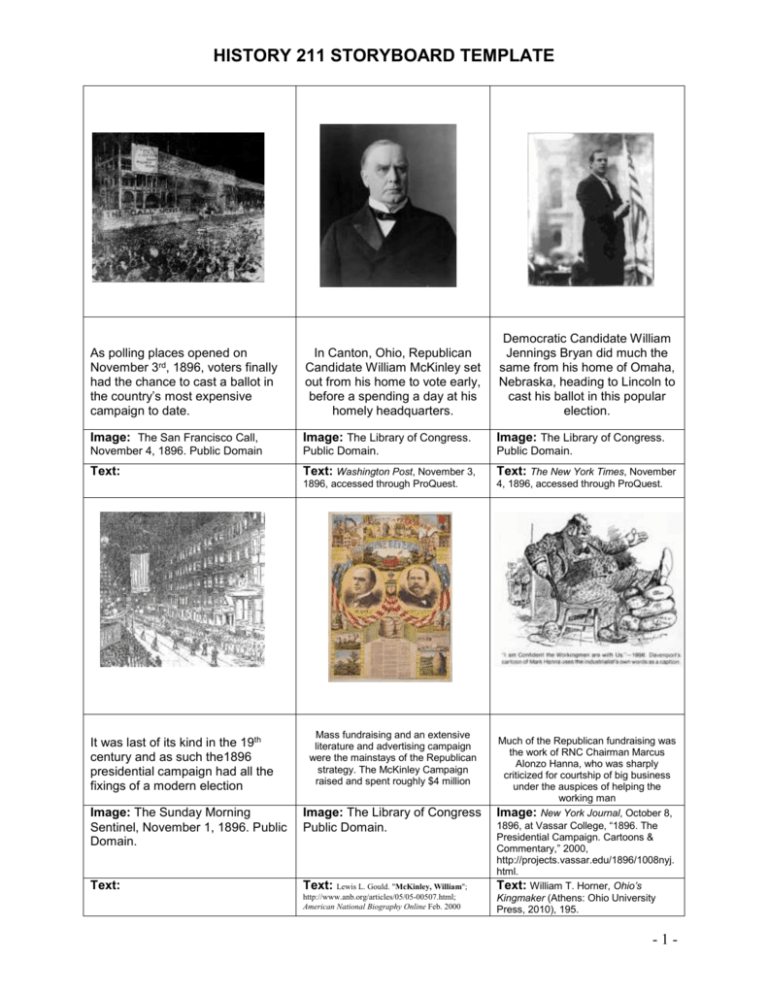
HISTORY 211 STORYBOARD TEMPLATE As polling places opened on November 3rd, 1896, voters finally had the chance to cast a ballot in the country’s most expensive campaign to date. In Canton, Ohio, Republican Candidate William McKinley set out from his home to vote early, before a spending a day at his homely headquarters. Democratic Candidate William Jennings Bryan did much the same from his home of Omaha, Nebraska, heading to Lincoln to cast his ballot in this popular election. Image: The San Francisco Call, Image: The Library of Congress. Image: The Library of Congress. November 4, 1896. Public Domain Public Domain. Public Domain. Text: Text: Washington Post, November 3, Text: The New York Times, November 1896, accessed through ProQuest. 4, 1896, accessed through ProQuest. It was last of its kind in the 19th century and as such the1896 presidential campaign had all the fixings of a modern election Mass fundraising and an extensive literature and advertising campaign were the mainstays of the Republican strategy. The McKinley Campaign raised and spent roughly $4 million Image: The Sunday Morning Sentinel, November 1, 1896. Public Domain. Image: The Library of Congress Public Domain. Text: Text: Lewis L. Gould. "McKinley, William"; http://www.anb.org/articles/05/05-00507.html; American National Biography Online Feb. 2000 Much of the Republican fundraising was the work of RNC Chairman Marcus Alonzo Hanna, who was sharply criticized for courtship of big business under the auspices of helping the working man Image: New York Journal, October 8, 1896, at Vassar College, “1896. The Presidential Campaign. Cartoons & Commentary,” 2000, http://projects.vassar.edu/1896/1008nyj. html. Text: William T. Horner, Ohio’s Kingmaker (Athens: Ohio University Press, 2010), 195. -1- Hanna was not well liked by all, especially those who spoke on behalf of organized labor. One paper labeled him a “vicious, carnal, and unrelenting oppressor of labor.” Hanna’s importance to the campaign and its outcome became a subject of criticism. In the rhymes of one sixteen year old poet, “Hanna to the rescue, Hanna of Ohio, Rallying the roller-tops, rallying the bucket-shops, Threatening drouth and death,” Image: St. Louis Post-Dispatch, 30 Image: New York Journal, October October, 1896, located at Vassar College, “1896,” http://projects.vassar.edu/1896/1030slpd.h tml. Text: People’s Party Paper, October 16, 1896, quoted at Vassar College, “1896,” http://projects.vassar.edu/1896/republican s.html. 13, 1896, at Vassar College, “1896,” http://projects.vassar.edu/1896/1013nyj .html. Instead, William Jennings Bryan personally brought his message to the people, criss-crossing the country between July and November giving well over 500 speeches. This was in sharp contrast to McKinley, who refused to travel and instead conducted a “front porch” campaign from his home, receiving a constant stream of Republican delegations. Image: Alexander Kelly McClure and Charles Morris, The Authentic Life of William McKinley, 189. PD. Image: The Library of Congress. Public Domain. Text: Chicago Daily Tribune, 2 November 1896, accessed through ProQuest. Text: Vachel Linsday, “Bryan, Bryan, Bryan, Bryan,” in George Whicher, ed., William Jennings Bryan and the campaign of 1896 (Boston: D.C. Heath and Company, 1953), 105. Text: Horner, Ohio’s Kingmaker, 203 The less well organized Democratic Party did not have the funds of their Republican counterparts, raising only $300,000 for the campaign Image: The Library of Congress. Public Domain. Text: Robert W. Cherny. "Bryan, William Jennings"; http://www.anb.org/articles/06/0600070.html; American National Biography Online Feb. 2000. Although the candidates themselves spoke of many issues, the underlying split between them was the federal economic policy over the coinage of silver Image: Boston Globe, September 13, 1896, at Vassar College, “1896,” http://projects.vassar.edu/1896/0913bg .html. Text: Gould, “McKinley, William,” American National Biography Online. -2- HISTORY 211 STORYBOARD TEMPLATE McKinley solidly endorsed his party’s platform, which opposed the free coinage of silver and maintained the gold standard, calling itself “unreservedly for sound money” On the other hand, Bryan was fully committed to the free silver platform, having been nominated after his DNC speech claiming “you shall not crucify mankind upon a cross of gold.” Although barely old enough to be eligible for the presidency, Bryan was able to unite Democrats, Silver Republicans, and Populists behind his free silver message. Image: The Library of Congress. Public Domain. Image: Judge, September 19, 1896, at Image: The Library of Congress. Vassar College, “1896,” http://projects.vassar.edu/1896/0919judg e.htm. PD. Public Domain Text: UCSB Presidency Project , “Republican Text: Bryan’s “Cross of Gold Speech: Party Platform 1896,” http://www.presidency.ucsb.edu/ws/index.php?pi d=29629. Mesmerizing the Masses” GMU History Matters Project, 2005, http://historymatters.gmu.edu/d/5354. Text: Cherny, “Bryan,” American National Biography. Although the key issue was silver, McKinley spoke often of tariff protection in addition to the gold standard. Political cartoonists and critics alike lampooned McKinley for focusing on the sole issue. Others criticized McKinley’s refusal to campaign outside of his home, even stating he was afraid of Bryan when invited to engage in a joint debate. Image: Rocky Mountain News, Image: St. Louis Dispatch, September September 14, 1896, at Vassar College, “1896,” http://projects.vassar.edu/1896/0914rmn.ht ml. 5, 1896, at Vassar College, “1896,” http://projects.vassar.edu/1896/0905slpd. html. Public Domain. Text: Text: Atlanta Constitution, September 14, 1896, accessed through ProQuest. Republican critics were equally as critical of Bryan and the Silver Platform. Senator Collum compared the free silver theory to the “evil theories” of the French Revolution and stated “too many are rushing toward the same reasonable results for which Robespierre and the other French revolutionaries stood as the horrid representative.” Image: Harper’s Weekly, July 18, 1896, at Vassar College, “1896,” http://projects.vassar.edu/1896/0 718hw.html. Text: Washington Post, August 23, 1896, accessed through ProQuest. -3- HISTORY 211 STORYBOARD TEMPLATE The extensive Republican literature campaign and Bryan’s many personal addresses spread their respective messages far and wide. Close to 80% of eligible voters flocked to polling places on November 3rd. Despite this turnout, the day passed quietly. The two candidates, voting early, each did so with his own procession and crowd. As dispatches and returns came in, the McKinley camp cheered at the success. Although McKinley was not premature in claiming any victory, he went to bed late with little doubt he was to be president. Image: Rocky Mountain News, November 4, 1896. Public Domain. Text: UCSB American Presidency Project, Image: McClure, Authentic Life, 190. Public Domain. Image: McClure, Authentic Life, 170. Public Domain. Text: Paul W. Glad, McKinley, Text: Washington Post, November 4, 1896, “Voter Turnout in Presidential Elections,” http://www.presidency.ucsb.edu/data/turnout.php. Bryan, and the People, (New York: J.B. Lippincott Company, 1964), 190. accessed through ProQuest. THE END The picture for Bryan was likely much more bleak. Though he carried doubtful states, McKinley held a sound electoral majority. The Democrats conceded the election on the 5th. Image: Library of Congress American Memory Project, http://photoswest.org/cgibin/imager?00185858+Rh-858. Permission granted by Denver Public Library. Pending. Text: The New York Times, November 6, 1896, accessed through ProQuest. Although some would cry fraud, the high participation left little doubt as to the majority voters’ preferences. As election day came to a close, Mark Hanna would tell McKinley, “You have been elected to the highest office to the land by a people who have always loved and trusted you.” The Republicans had won Image: Library of Congress, http://hdl.loc.gov/loc.pnp/cph.3c03995 and Boston Globe, November 4, 1896. Public Domain. Text: Boston Globe, November 4, 1896, accessed through ProQuest. -4-
